Comprehensive Detailed Guide about Chestnut Honey
We usually get confused while seeing numerous honey varieties at the store and deciding which the best to buy is. Chestnut honey is a complex honey variety that is becoming popular among consumers. But why is it so? This is because this honey variety is dark & spicy, offering a mysterious & nuanced taste that the worldwide people now enjoy. Sounds interesting, right! Let's know more about it.
Table Of Contents

- What is Chestnut honey?
- Origin of Chestnut Honey
- How Do Bees Produce Chestnut Honey?
- Favorable Conditions to Produce Chestnut Honey
- Properties of Chestnut Honey
- Benefits of Chestnut Honey
- Does Chestnut Honey Crystallizes
- Is Chestnut Honey a Good Antibiotic & Antiseptic?
- How to Use Chestnut Honey
- Is Chestnut Honey Vegan?
- When to Avoid Chestnut Honey?
- What is the Average Price of Chestnut Honey?
- Takeaway
- Our Chestnut Honey
What is Chestnut honey?
Chestnut honey is a monofloral honey variety produced by the bees using the nectar of chestnut flowers. It is a stronger honey variety that the people have enjoyed for centuries. It offers a unique taste and extraordinary health benefits.
Chestnut honey is ideal for people who like not much sweet but somewhat more perplexing taste. It's been described as smoky, hot, and spicy, and it is regularly combined with aged cheeses, new pears, and good meat dishes.
The flavor of the honey can fluctuate from one region to another, and no two chestnut honey varieties taste the same. Moreover, chestnut honey is slow to crystallize since it contains a generally high level of fructose.
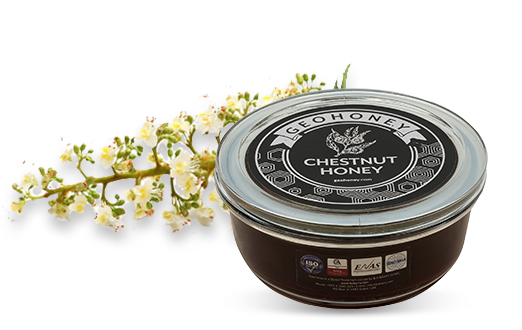

Origin of Chestnut Honey
The sweet chestnut trees have originated from the mountainous Mediterranean region from an area that is now known as Turkey. This species of the chestnut tree is known for producing the highest amount of chestnut honey in Europe.
In Asia, the Japanese Chestnut (Castanea crenata) is grown mainly in South Korea. In China, there are three dominant honey-producing species: Chinese Chestnut (Castanea mollissima), Henry Chinkapin (Castanea henryi), and Sequin (Castanea Seguin).
In the United States, the essential source of chestnut honey comes from the Allegheny Chinkapin (Castanea pumila), found in the Southeastern region of the country. The American Chestnut (Castanea dentata) was a species of chestnut trees local to the United States; however, it was later wiped out by a fungus during the early 1990s.
How Do Bees Produce Chestnut Honey?
When the worker bees collect the chestnut nectar, it is mixed with the bee enzyme in their mouth, which is secreted from the bee's glands. This nectar is transferred mouth-to-mouth from the worker bees to the hive bees. This process reduces the water content that converts nectar into honey.
After this process is done, this honey is deposited into wax cells. As the water content in the stored chestnut honey is still too high, honey bees will fan their wings above the wax cell.
Once the bees complete this whole process it reduces the water content to as low as 20%. After doing this, honey bees cap the wax cells again and repeat the process.
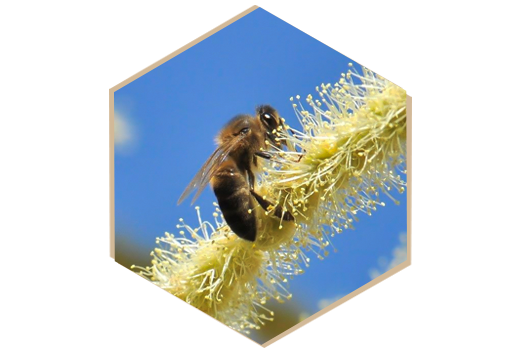
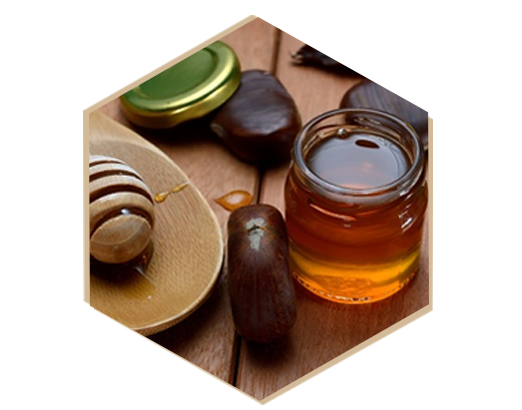
Favorable Conditions to Produce Chestnut Honey
These trees usually grow in areas with well-drained soil, which is slightly acidic. These trees should be planted in full sun or partial sun, and once they are grown, they are exceptionally lenient to the dry season. Unfortunately, the European chestnut trees are not as cold-tolerant as the Chinese varieties.
Honey bees don't have much chance to gather the nectar from the different types of chestnut trees. The sprout time frame is twelve to eighteen days and starts late June to early July. Although chestnut trees are a decent source of nectar and pollen, they also produce honeydew, the sweet, tacky substance discharged by bugs like aphids.
When the honey bees are gathering nectar, they may also bring back honeydew as a source of food. Chestnut honey is produced using roughly 84% bloom nectar and 16% honeydew.
Properties of Chestnut HoneyHoney
Chestnut honey offers a solid aromatic taste with a slightly bitter after-taste. This honey variety is rich in pollen content, mineral salts, and tannin, with a high proportion of fructose that resists crystallization and relatively low acidity. Dark in color, ranging from yellowish-brown to almost black, sometimes with amber color, has an aromatic, spicy herbal aroma and taste and is slightly tannic. The flavor is unique, not very sweet, and very persistent. This honey variety is highly appreciated by those who like strong, less sweet honey. Chestnut flowers bloom from May to June.
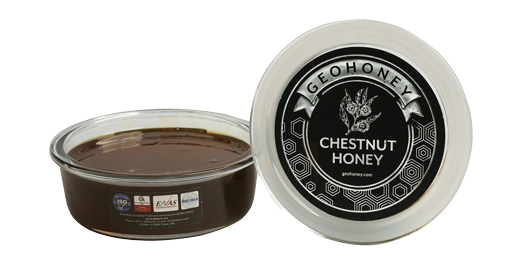
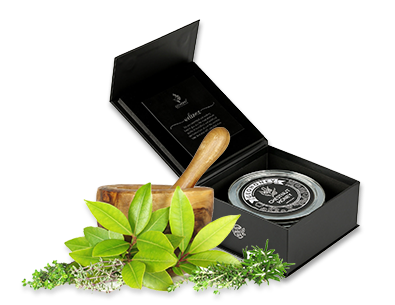
Benefits of Chestnut Honey
As it offers a unique flavor, chestnut honey is highly advantageous against many diseases. This is because it is rich in minerals, antioxidants, and antibacterial activities. Below are some of the miracle benefits of chestnut honey:
-
High fructose is an ideal energy store. Chestnut honey is exceptionally rich in fructose. You can consume chestnut honey consistently to dispose of your body fatigue. Hence, you will feel more incredible by disposing of fatigue.
-
The issue of skin breakout is one of the issues that many individuals endure. Chestnut honey is excellent for skin break out with antibacterial impacts. You can apply chestnut honey as a cover to your face by blending it in with oat flour. It also diminishes skin shedding.
-
It prevents skin aging due to the high cancer prevention agents. The counter maturing highlight makes your skin look more youthful.
-
Vitamin B, vitamin C, minerals, and iron-rich chestnut honey increases blood circulation. It is competent in the treatment of liver and stomach diseases.
-
Chestnut honey protects you against heart disease. Helps prevent heart attack by lowering cholesterol. It strengthens the heart rhythm.
-
It is also rich in antioxidants and good for arthritis diseases that cause inflammation in joints.
-
It is also against the flu, and colds usually occur when it gets cold. It affects cough and tonsillitis.
-
Chestnut honey is highly effective in curing eye diseases. It assists well in enhancing eye health.
-
Chestnut honey is beneficial for the digestive system. It prevents constipation, cures digestive system disorders, and maintains good health.
Does Chestnut Honey Crystallizes?
Crystallization is a natural process that happens almost to any raw honey worldwide. Therefore, crystallized honey will not affect the quality of the honey.
When the raw honey crystallizes, put the jar of honey into warm water no more than 35 degrees C and wait for a couple of hours to become a thin liquid again.
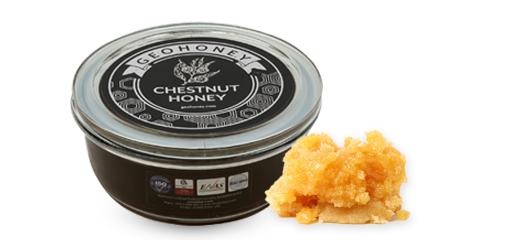

Is Chestnut Honey a Good Antibiotic & Antiseptic?
The hydrogen peroxide in chestnut honey and low moisture content can decrease the bacterial load. In addition, a few examinations have shown that chestnut honey can repress the development of microorganisms that promote bacterial illnesses, E. coli and Candida.
The individuals who consumed chestnut honey had a quicker recuperation time following respiratory infections.
How to Use Chestnut Honey?
Chestnut honey is not for the timid palate, no doubt. It can be used in baked cookies, cakes, and tarts and make intensely flavored ice cream. It can be used in marinades and added to tea & coffee. It can be well enjoyed by drizzling over Pecorino Toscano with some fresh pears.
For all those who love potent flavors, they can try making a sandwich of rustic walnut bread and spicy Mountain Gorgonzola. To make a quick breakfast, spread a thick slice of toasted semolina bread with sweet margarine and some chestnut honey. Of course, there might be no way other than straight ahead after that.
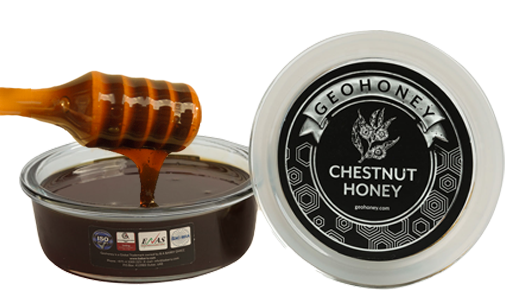
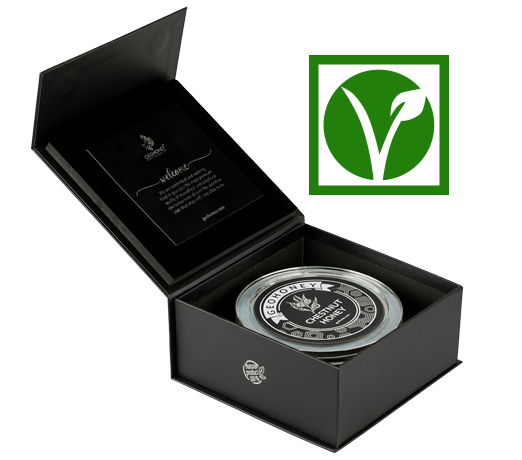
Is Chestnut Honey Vegan?
The Vegan Society doesn't consider honey a vegetarian product; this incorporates cornflower honey. However, they accept that since a few honey beekeepers supplant honey with a sugar substitute while harvesting, it will generally come up short on fundamental micronutrients of honey, along these lines being inconvenient to the honey bees. In addition, this mixing of corn syrup in the hives is also very harmful to the honeybees and degrades their health.
Moreover, they accept that honey bees are explicitly reared to increase efficiency in beekeeping. Which they accept prompts a restricting of the gene pool and increases susceptibility to disease and large-scale colony collapse.
They also believe that a few beekeepers might winnow their hives post-reap and drastically limit the queen honey bee to prevent them from continuing to begin another state. Consequently, the Vegan Society doesn't think about honey vegetarianism. That doesn't prevent a few veggie lovers from contending it's fine, assuming they source their honey from solid sources that do not practice the above.
When to Avoid Chestnut Honey?
People who are allergic to chestnut pollen shouldn't consume chestnut, honey. Also, pregnant or breastfeeding women should try not to eat honey, and it should never be given to babies under one year of age. This is because of botulism spores that a newborn child's immature digestive system cannot handle.
Before consuming honey, people with diabetes, pre-diabetics, and who experience the ill effects of high or low blood pressure should talk with a specialist or dietitian.
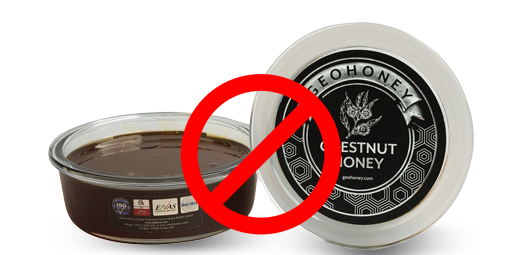
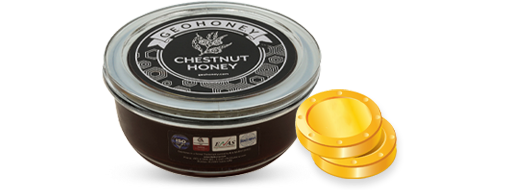
What is the Average Price of Chestnut Honey?
Chestnut honey is an expensive honey variety. Its high cost is due to the rarity of the chestnut trees and the unique environmental conditions required for the development of trees. The average price of chestnut honey in the global market ranges between $4 to $6 per 100gm.
Takeaway
Chestnut honey has become a popular variety among people worldwide. Whether drizzled over your favorite fruits or strong cheeses, it will surely relish your taste buds. The unique, eclectic taste of chestnut honey is the key factor that boosts its popularity. Order this excellent honey variety at the best prices at Geohoney and prepare delicious dishes in a quick time. Eat healthy, live healthier with us!
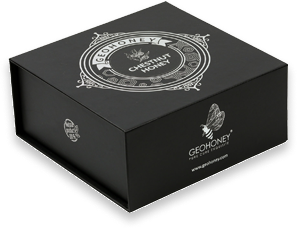
BUY OUR CHESTNUt HONEY
What’s the buzz, Join the hive !
SIGN UP TO OUR NEWSLETTER
Be the first to know about our hot deals, new arrivals.



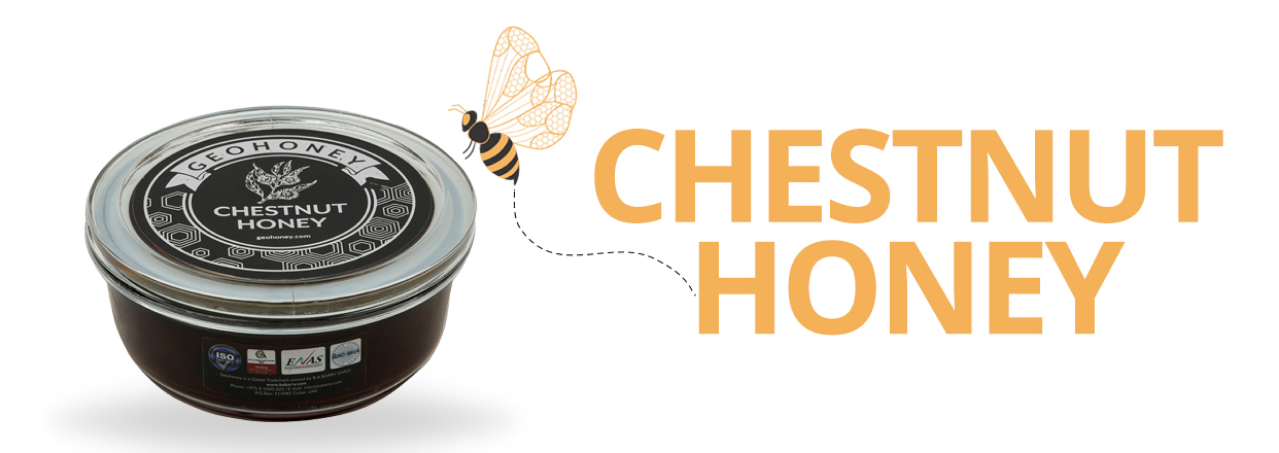

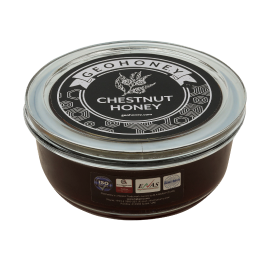


 Pay By Cards
Pay By Cards
 PayPal
PayPal
 Stripe
Stripe
 Other Payment Methods
Other Payment Methods










